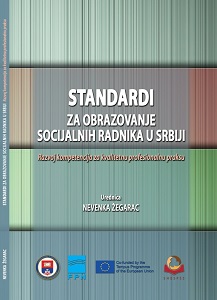
We kindly inform you that, as long as the subject affiliation of our 300.000+ articles is in progress, you might get unsufficient or no results on your third level or second level search. In this case, please broaden your search criteria.










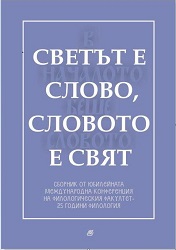
In 2016 we have celebrated two significant events: a Silver jubilee to mark the 25th year of the establishment of the Faculty of Philological Studies and the 40th anniversary of the foundation of the South West University in Blagoevgrad. Both events are loaded not only with the symbols of the anniversaries but also with the hard work, perseverance, commitment and emotions of a few generations of scholars and researchers, who devoted their time and work to the elevation of the philological and university knowledge in South-west Bulgaria to the highest ranks in the country. The Collection of articles, offered to the readers’ attention, has been named after the National conference with international participation: “The World is the Word and the Word is the World” since our admiration for the words is in the base of our love to philological knowledge. It comprises most of the conference papers, presented in the event, organised as part of the celebrations of the two anniversaries – of the Faculty of Philological Studies and of the South-West University in Blagoevgrad. The event evoked significant interest, which is a clear sign for the fact that philology and our faculty have a great number of loyal friends not only in our country but also abroad. Our conference attracted more than a hundred philologists from over ten countries – Norway, The Czech Republic, Slovakia, Macedonia, Ukraine, Poland, Serbia, Greece, Croatia, Bosnia and Herzegovina, and, certainly, Bulgaria. Articles by prominent scholars from the major Bulgarian universities – SU ‘St. Kliment Ohridski’, St Cyril and St Methodius University of Veliko Turnovo, PU ‘ Paisii Hilendarski’, BU ‘ Prof. Dr Asen Zlanatarov’ as well as a number of research institutions such as the Bulgarian Language Institute ‘Prof. Lyubomir Andreychin’, the Literature Institute of the Bulgarian Academy of Sciences (BAS), the Institute of Ethnology and Folklore Studies and the Ethnography Museum of BAS, the Institute of Solid-state Physics ‘ Acad. Georgi Nadvakov’ of BAS, the Cyril-Methodius Research Centre of BAS, etc – stand out among the contributions to the Collection. Research papers were presented by scholars from a number of European centres of learning: the University of Oslo, Norway; the University of Eastern Sarajevo, Bosnia and Herzegovina; Macedonia University in Thessaloniki, Greece; Trnava University in Bratislava, Slovakia; Charles University in Prague, the Czech Republic, etc. The multiple contributions present a large diversity of research topics coming from nearly all spheres of philological knowledge – from linguistics and the social nature of language, through philosophy, semiotics and the pragmatics of language to the problems of Bulgarian and European literature and literary theory, of folklore, ethnology, ethnography and the preserving of cultural heritage. The order of the papers, published in the proceedings, follows the conference programme so the reader will be able to choose from the following seven topical areas: 1. Linguistics: synchronic and diachronic research; 2. Language and culture. Language and subculture; 3. Sociolinguistics, folkloristics and ethnology; 4. Modern Bulgarian and world literature; 5. Media, communications and manipulation; 6. Translation and interpretation: theory and practice; 7. Methodology and didactics. One of the main purposes of such publications is the “meeting” and exchange of a multitude of scholarly ideas, as well as ideas of how we as philologists and humanity scholars can continue our work in a world set on the fast track and full of challenges, where the pragmatism of thought would often put established models on trial. The proceedings are printed on 537 pages and each text is accompanied by an annotation in English with keywords, for easier orientation in the topic area, and author’s E-mail contacts. Foreign language texts are printed in the original so that their meaning and ideas would not be lost in translation. The editors and authors of the conference proceedings, entitled “The World is the Word and the Word is the World”, hope that the present publication is compatible with modern philological research, matches the pragmatic ideas for the development of philology as a science, as well as satisfies the insatiable thirst for knowledge and explanation of philological issues, phenomena and facts from the world around us.
More...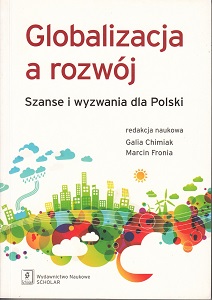
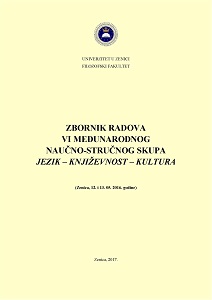
Changes in socio-economic and political relations inevitably imply changes in education. This paper discusses the reflections of social transition to the educational system in Bosnia and Herzegovina. The transformation of education in transition countries on the principles of Western European, democratic and civic education is particularly thematised in socio-cultural context of transitional problems and educational perspectives in Bosnia and Herzegovina. Bosnian-Herzegovinian society is experiencing a deep crisis. Education is at the centre of social problems, where it becomes a factor of social promotion, rather than a means of social change
More...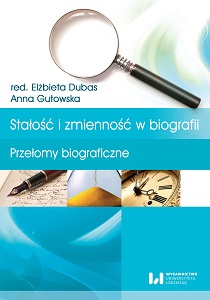
Discovering one’s self as a one having a vocation to priesthood is usually connected with a breakthrough experience – it may be small or global, may be one or many. Sometimes it manifests in the difficulty of describing an own experience, and on other occasions it is so vivid that it is forever engraved in the memory, with all of its details. Because it touches upon the spiritual life of an individual and connects with transcendence, it is a personal and intimate experience. In some biographies, a radical turning point is evident, and in others a long-lasting conversion of which the most evident display is adopting the perspective of a new group. The article describe four types of biographies of people having a vocation to priesthood, and including various breakthrough experiences. It is the result of research conducted with seminary students and priests, using a method of biographical interviews analyzed according to the concept by Fritz Schütze.
More...
The topic presents the author’s thoughts focused on certain chosen difficulties – the dilemmas related to writing an autobiography. The author draws attention to the biographer’s various references to his/her life events, including their concealment or change. She refers to the type of biography which is life story and its various contents, depending on a wider context. She explains what autobiography is and how to organize the autobiographic records.
More...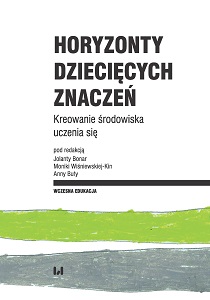


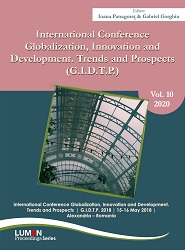
Proceedings Volume: International Conference Globalization, Innovation and Development. Trends and Prospects (G.I.D.T.P.)
More...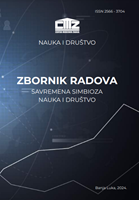
Znaĉaj nauke za ĉovjeka i ljudsko društvo vrlo je velik. Nauka je naĉin spoznaje svijeta. A svijet u kojem mi ţivimo je veoma ovisan o nauci i tehnologiji. Da bismo bolje navigirali ovim svijetom, potrebno je da znamo ponešto o osnovnim nauĉnim fenomenima – kako stvari rade, kako se nešto dešava i kako funkcionira naš organizam. Zato ulaganje u nauku i obrazovanje, a samim tim i u ljudske resurse, donosi veliku korist za pojedince i društvo u cjelini. Pojedinci i društvene grupe zauzimaju odreĊeno mjesto u društvu na osnovu znanja kojim raspolaţu. Ono unapreĊuje sve oblasti ĉovjekovog ţivota i djelovanja. Društvo i nauka su ĉvrsto vezani i nalaze se u meĊusobnom odnosu. Društvo je stvaralo uslove i davalo društveni ambijent u kome se nauka mogla razvijati. S druge strane, nauka je omogućavala brţi razvoj pojedinih društvenih oblasti i cijelog društva. Povoljni društveni uslovi uticali su na nastanak brojnih izuma, patenata, tehniĉkih rješenja i modernizacija. Razvoj informatike dodatno je ubrzao razvoj i povezivanje preduzeća, multinacionalnih kompanija, drţava regija i svijeta. Povećana je razmjena ljudi, dobara, proizvoda i usluga. Ĉetvrta industrijska revolucija otvorila je neslućene mogućnosti razvoja i dalje promjene društva, društvenih odnosa. Sve ove promjene utiĉu pozitivno i na razvoj cjelokupnog društva, ali i demokratije i ljudskih prava. Sve ovo govori o jednoj simbiozi koja je rezultirala da nauka i društvo postanu jedna savremena forma ljudskog ţivora i razvoja civilizacije u XXI vijeku. Zbornik radova pod naslovom „SAVREMENA SIMBIOZA - NAUKA I DRUŠTVO“ je publikacija nauĉnih radova u okviru nauĉnog skupa „Nauka i društvo“. Ova publikacija predstavlja nauĉne i struĉne radove već dokazanih nauĉnih radnika i istraţivaĉa, ali i onih koji su na poĉetku svog nauĉnog rada. U Zborniku su objavljeni radovi nauĉnih radnika iz Bosne i Hercegovine i Republike Srbije, koji su u skladu sa njihovim nauĉnim iskustvom, uz dobronamjerne recenzije, usklaĊeni i adekvatno kategorisani. S obzirom na multidisciplinarnost teme zbornik obuhvata radove iz raznih nauĉnih disciplina kao što su: ekonomija, pravo, bezbjednost, defektologija, politiĉke nauke, sociologija i pedagogija. Radovi su aktuelni i obraĊuju savremena društvena pitanja i probleme, ali i teorijska i praktiĉna dostignuća pojedinih nauĉnih disciplina. Na takav naĉin dajemo podsticaja svim mladim ljudima da kroz svoj nauĉni rad daju doprinos u rješavanju brojnih društvenih problema. Upravo i prilikom izbora tekstova ureĊivaĉki odbor je ţelio da takvi radovi budu prioritetni u ovom zborniku, te je i sam naziv istog proistekao iz te ideje i potrebe. Nauĉni radnici, posebno oni koji su na poĉetku svoje akademske karijere, trebaju podršku kako bi istrajali u svom usavršavanju i nauĉnom dokazivanju. Ovaj Zbornik, kao i sam nauĉni skup, nastao je iz entuzijazma nekolicine profesora okupljenih oko Centra modernih znanja, da kroz ovakav vid nauĉnog rada otvore vrata nauke svim mladim nauĉnim radnicima i istraţivaĉima kako bi i njihova empirijska istraţivanja i dobijeni rezultati bili prezentovani široj javnosti. TakoĊe, dosadašnja saradnja sa kolegama iz Beograda i Nikšića rezultirala je da izdavaĉi ovog zbornika budu tri udruţenja iz regiona koja već duţi vremenski period saraĊuju organizujući razne edukacije. Brojni radovi otvaraju razne dileme i ostavljaju mjesta diskusiji kako i na koji naĉin nastaviti i razvijati razne nauĉne discipline. S tim u vezi ostavljamo vam prostora, da i vi svojim sugestijama i razmišljanjima, zajedno sa autorima traţite efikasnija rješenja i mogućnosti. Ovaj Zbornik nije konaĉan, jer nauka svaki dan traga za neĉim novim pa tako i autori i ureĊivaĉki tim ove publikacije.
More...